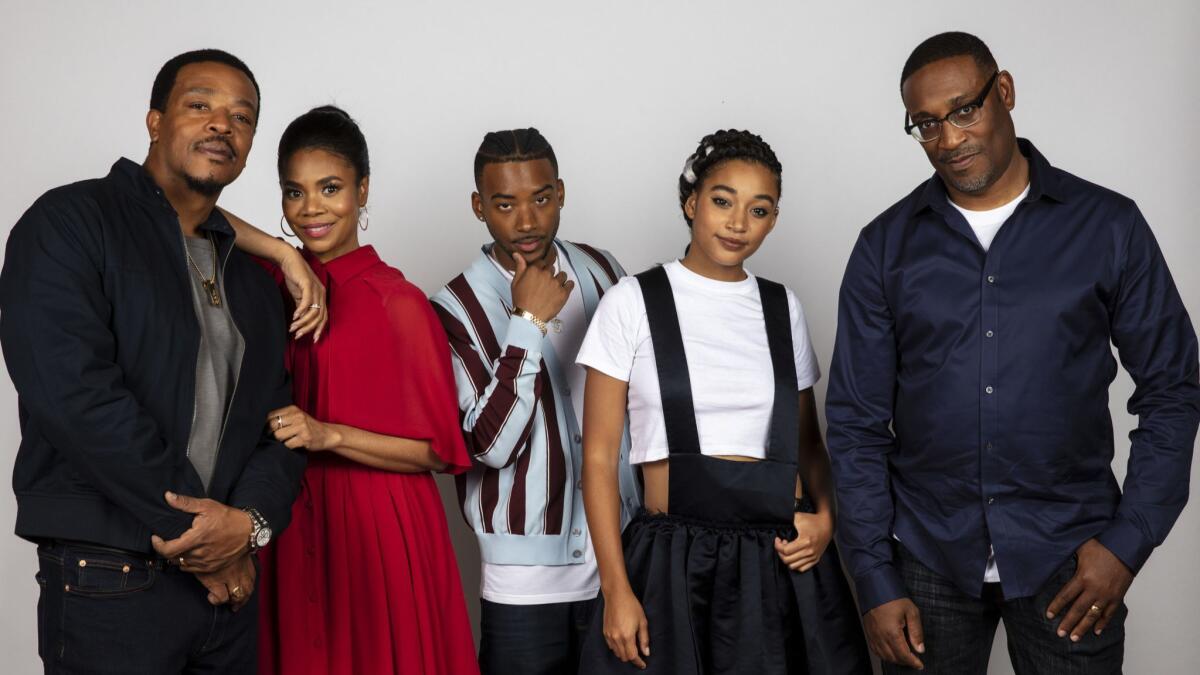Indie Focus: A lot of TIFF, a little Hal Ashby and remembering Burt Reynolds
- Share via
Hello! I’m Mark Olsen. Welcome to another edition of your regular field guide to a world of Only Good Movies.
This week saw the death of a Hollywood star the likes of which they simply do not make anymore, the incomparable Burt Reynolds. From his free-wheeling collaborations with director Hal Needham on titles such as “Hooper” and the “Smokey and the Bandit” pictures to roles in movies such as “Deliverance,” “Hustle,” “Semi-Tough,” “Starting Over” and “Boogie Nights” he always had a charming, easygoing screen presence. Plus, he made being a movie star just look fun.
Jeffrey Fleishman wrote a wonderful appreciation of Reynolds’ career, saying, “You had to like him, coming at you with a wink and a smile, as if he had swallowed all the world’s secrets… Burt Reynolds was a charmer, a spinner of wiles and self-deprecating grace. He was the kind of guy you’d sit with in a roadhouse and watch unfold a map to all the places you’d never been.”
We’ll have a screening this week of “All About Nina,” a drama set in the world of stand-up comedy, followed by a Q&A with writer-director Eva Vives and star Mary Elizabeth Winstead. For info and updates on future screenings, go to events.latimes.com.

Toronto International Film Festival
The Toronto International Film Festival is many things, which is what makes it such a vital pivot point on the annual movie calendar. The festival provides a chance to catch up with many titles that have been premiering at festivals earlier in the year, allowing for a quick snapshot sample, but it more importantly serves as a launching point for many titles still to open, in particular those looking to sail on into the awards race.
We’ve got a big team up north covering all the action as it happens. Photographer Jay L. Clendenin is also running a photo studio to capture many of the festival’s biggest names and rising stars.
I wrote a preview and overview piece on this year’s TIFF, noting how many of the top titles seem more socially and politically engaged, including Barry Jenkins’ “If Beale Street Could Talk” and Steve McQueen’s “Widows” alongside documentaries such as Michael Moore’s “Fahrenheit 11/9.” This awareness has extended to the larger ecosystem of the festival itself, which made a commitment to change the makeup of the press corps that covers it by purposefully including more journalists from underrepresented communities.
Cameron Bailey, artistic director and co-head of the festival, said that festival organizers had been noticing a disconnect between how certain titles were talked about at the festival and subsequently when they went into release, and they wanted to bridge that gap.
“And the more you notice that disconnect,” Bailey said, “the more you notice that what happens at festivals maybe needs to shift and get a little bit closer to the general reaction to movies.”
Jen Yamato wrote about Tim Sutton’s “Donnybrook,” a brutal action drama starring Jamie Bell, Margaret Qualley and Frank Grillo that is also a startling look at how drugs and poverty affect a community.
Sutton and his three stars all spoke to Yamato about the film, which Bell summarized as “a horrible Mark Twain nightmare set in a Trump America.”
Tre’vell Anderson spoke to the team behind ‘The Hate U Give,’ an adaptation of the popular young adult novel that deals with contemporary issues of police violence.
“The whole process of filming felt like a grieving process, a space and time to honor the lives of those who’ve been killed by police, to think about the significance of their lives,” said the film’s star, Amandla Stenberg.

Justin Chang wrote about the opening night film, David Mackenzie’s “Outlaw King” starring Chris Pine, of which he said, “the movie is a juicy slab of cinematic red meat, a symphony of mud, blood and viscera set to a soundtrack of thundering hoofbeats and howls of vengeance.”
Chang’s dispatch also took note of Olivier Assayas’ “Non-Fiction,” starring Guillaume Canet and Juliette Binoche in a story that juggles relationship issues with concerns over the encroaching power of digital technology over everyday life. As Chang put it, “For anyone who has spent much time traveling the international film-festival circuit, it will be hard to watch ‘Non-Fiction’ without reflecting on how the steady rise of all things digital has impacted the art and technology of cinema.”
Glenn Whipp took a look at the awards season chances for three films screening in the festival, Sara Colangelo’s “The Kindergarten Teacher,” starring Maggie Gyllenhaal, Renaldo Marcus Green’s “Monsters and Men,” starring John David Washington, and Lee Chang-dong’s “Burning,” South Korea’s submission for the foreign language film Oscar.
Amy Kaufman uncovered a controversy around “The Predator,” opening title of the Midnight Madness section, in that a convicted sex offender was cast in the movie and subsequently had his scene removed.
I also spoke to Errol Morris about his documentary “American Dharma,” about controversial political advisor Steve Bannon. Morris said he was inspired to make the movie because the events it attempts to examine are ongoing, saying, “You can’t put a period at the end of this sentence... I mean I made the movie telling myself I just could not sit on my hands through all of this. I had to do something.”
And Josh Rottenberg spoke at Telluride to the directors of two movies that also promise to make a big impact at Toronto, Alfonso Cuarón with “Roma” and Damien Chazelle with “First Man.”
‘Hal’
Hal Ashby, director of films such as “Shampoo,” “Coming Home” and “Being There,” is the kind of filmmaker about whom much has already been said and yet you can never say too much. His name is frequently invoked by contemporary filmmakers as someone who made the kinds of movies they would want to make, entertaining but serious, compelling and watchable with a lot on their minds.
A new documentary on Ashby, titled simply “Hal,” is already playing in New York and is opening in Los Angeles on Sept. 14. Directed by Amy Scott, the documentary covers Ashby’s trajectory from Oscar-winning editor to a director all his own, placing him squarely at the center of the New Hollywood of the 1970s without flinching from the self-destructive impulses, both professional and personal, that would be his undoing in the 1980s.
In her review for the New York Times, Manohla Dargis wrote of the film’s many voices, including collaborators like Norman Jewison, Robert Towne and Jane Fonda and admirers like Judd Apatow, Lisa Cholodenko and Adam McKay, noting, “Taken together, they may not always make the strongest case for Ashby’s cinematic genius (the films themselves are greater proof), and there’s also a bit too much vague talk about humanism and individuality. But with Ms. Scott, they remind you that some of his films remain among the finest American works of his era, even if I’m not convinced that I need to see ‘Harold and Maude’ again.”
At the Ringer, Sean Fennessey wrote a loving tribute to the filmmaker and his work, saying, “Ashby had a way of making his movies about weighty ideals and real-seeming people, neither of which have aged much in the past 40 or so years. They explored friendship, romance, war, peace, sex, race, gender, celebrity, and parenthood. They scaled politics and international conflict and television. Ashby made message movies with a simple code of empathy and decency. They reflected the man, who carried one of the most unwavering reputations among colleagues in his profession.”
Email me if you have questions, comments or suggestions, and follow me on Twitter @IndieFocus.
More to Read
Only good movies
Get the Indie Focus newsletter, Mark Olsen's weekly guide to the world of cinema.
You may occasionally receive promotional content from the Los Angeles Times.











